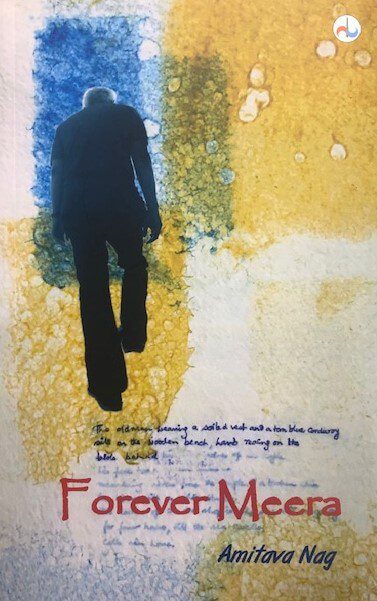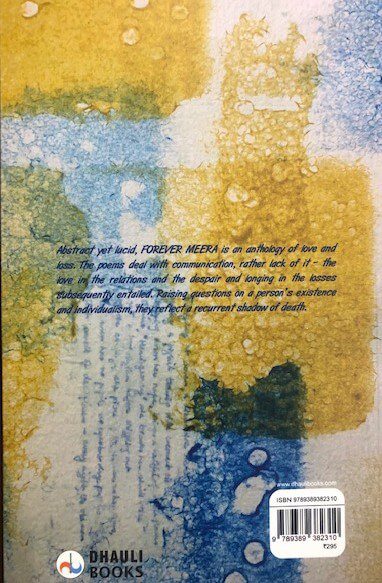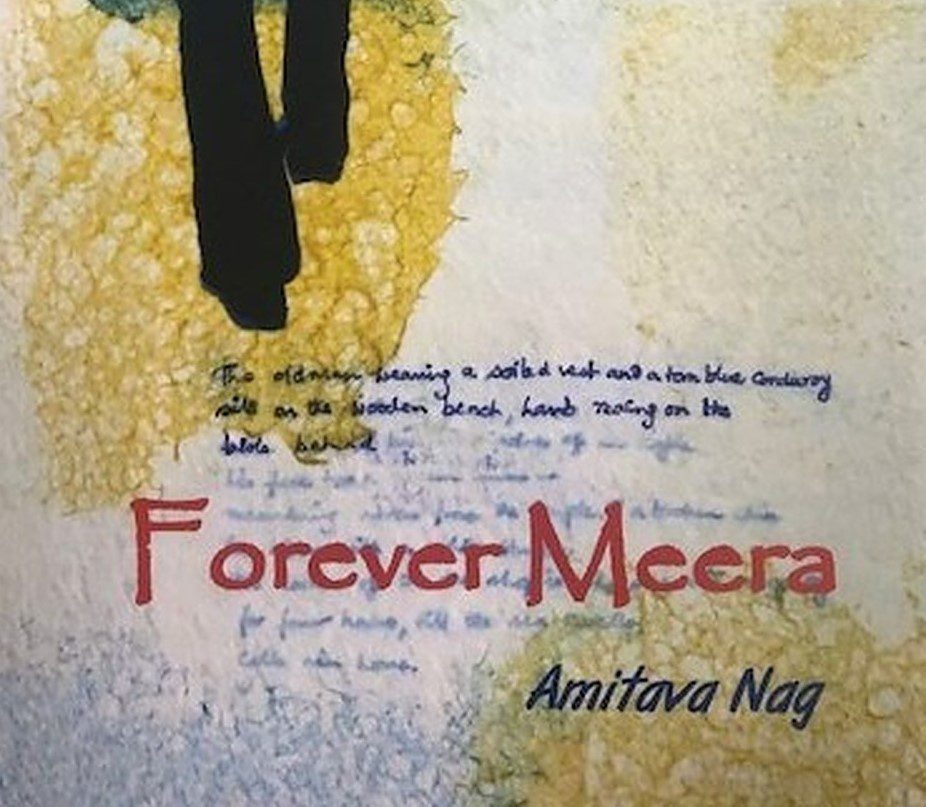Gopal reviews Forever Meera, by Amitava Nag, a bilingual poet, writer, and film critic. An exclusive for Different Truths.

Book: Forever Meera
Author: Amitava Nag
Publisher: Dhauli Books, Bhubaneshwar
Price: INR-295/-
ISBN: 978-93-893823-1-0
Poetry is not just the language of our hearts but sometimes merely whispers from our souls.
Poetry is not just the language of our hearts but sometimes merely whispers from our souls. At the same time, it also helps identify the state of the society. Gertrude Stein once remarked, ‘Poetry is concerned with using with abusing, with losing with wanting, with denying with avoiding with adoring replacing the noun. It is doing that always doing that, doing that and doing nothing but that. Poetry is doing nothing but using but using losing refusing and pleasing and betraying and caressing nouns. That is what poetry does, that is what poetry has to do no matter what kind of poetry it is. And there are a great many kinds of poetry,’
A bilingual poet, writer and film-critic, Amitava Nag’s poetry examines various forms that caress and nurture thoughts and provide insight. His love motif ‘Meera’ is sprinkled across the poems in a way that’s nuanced and refreshingly animated. In his charming collection of poems titled, Forever Meera, Nag transports the readers to images and impressions from different geographies that goes beyond the simple and ephemeral and draws the seismic markers between time and identity.
His poems appear to wrestle with inner workings to reaffirm life and love through his creative verse.

His poems appear to wrestle with inner workings to reaffirm life and love through his creative verse. The poet treats the poems like a canvas, filling it with layers of careful detail; restrained, sparkling lines, and moving word play. He applies his coiling conversational voice to the different extensions of life.
Diffident, quiet, and crafted, these understated poems can find a minimal application of juxtaposition that meditates between body and soul, while at the same time a profound sense of quietude is evoked. The elegantly phrased and rhythmically paced description is painterly. Readers are drawn into his poems by their quality of confiding familiarity and rare brevity.
There are a few poems, personally, I’d have preferred them more succinct and crustier. But they do play a significant poetic role, adding further consistency to a work that is intimate, multihued, and the wealthier and more avant-garde for it. The following poem is a good example.
or is it the empty heat of a summer day, the distorted thoughts of a sleepwalker’s son, the underside of a sparrow’s wings inside my brain, the naked look on her glistening knees- the brings out the man in me? (The man in me)
I like the simple yet measured approach in most of the poems and the poet draws the current moods with ease and precision.
I like the simple yet measured approach in most of the poems and the poet draws the current moods with ease and precision. The poems not only echo with things lost and things found, but through a inspiring and original lens, they see the invisible and speak the inarticulate.
The images fill up Shadows of togetherness Cluttered-this is how Every man trades his solitude. (Solitude) Or Your left eye seems like crying, The right looks out of me Searching the warm, mahogany colour Of the long room- you smile with The right eye- Venus of Kolkata. (Venus of Kolkata)
Lively and surreal at times, (a lonely kite/waits/with my words-/never sleeps), here is a poet whose work in all its vigour and variety…
Lively and surreal at times, (a lonely kite/waits/with my words-/never sleeps), here is a poet whose work in all its vigour and variety, draw brooding images of despair and longing, love and grief with effortless ease.
One day Arteries and veins Stop Thinking about You, Die (One day) (Eternal Tree)
The revisiting, the insinuation, the heaving something from the past, even when it doesn’t feel as if it’s your past, and making something of the moment with it, this chronicle of loss is not just a register of loss but a lesson: Sometimes we know who we are by remembering what we’ve lost. And yet, it’s not gloomy; instead, it’s a reminder — of how only the living moves on. There is a weighted stillness to much of his poems, with unstinted love for the lover, for mother– and a marked refraining of words – ‘she weaves forever’. Moments of ephemeral beauty and losses are handled with equal skill in the following poem.
I make her ring my mobile screen reads “Ma”, and I disconnect then connect again, pause. (Saudade)
Some of his poems instantly offer forthright presence: a personal voice making honest admissions about apocalyptic scenes.
Some of his poems instantly offer forthright presence: a personal voice making honest admissions about apocalyptic scenes. It’s a collection that extends hands and heart to a reader — no repetition or vague shadings. For all its personal testimony and despair, his poems are seemingly alive.
Every man needs a few centuries, to unwind the wound, to gasp for metaphors changing his life, (Wish)
The rambles in his poems are almost always fuelled by a sort of depressive restlessness. Conveying clear ideas through sharp, subtle images, Amitabha’s poems typically unfold in short lines. He tutors and queries; he laments and rhapsodises.
You followed me Everywhere, on the broken Rainbow and the stilted Waterfall, the placid mourning Of a crowded marketplace, to the Songs of a bling nightangle- I could feel you breathe Down my back (Today is not my birthday)
Most of the poems reside on the queries of who we are and where we belong…

Most of the poems reside on the queries of who we are and where we belong – of what separates us and what ties us in the society. Those are the signifiers we are invited to discover in this evocative poem.
You pile up expectations- unrequited you flounder friend- my fault? I am sending neglect In my garden. (A requiem)
He writes poems that are full of life and beyond the ordinary even when he is thinking through love and grief, but in their sweeps, they defy easy notions of pure love. The love-light in the face of ‘Meera’ remain amazing and beguiling.
Yet, I concur my dried lips walk up to your door, wait- Talk to me Meera Tell me you never knew me, At least. (Silence)
In this elegant and assured collection of poems, the poet also spirals familiar forms into new shapes…
In this elegant and assured collection of poems, the poet also spirals familiar forms into new shapes (like notebook entry) that turn toward and challenge the reader in no uncertain terms, Mornings, /Pigeons, /Kids, /Fat women- a city mall. (At a city mall).
The thinking is often more complex than the language: the book is full of twists and turns in which the poet seems surprised by what it chooses to show him and delightfully hesitant about visiting his sense of things on the poems.
Couple of years ago, even whispers Had wings of mist, Fugitives of rain Till one day when the Sun was at its fullest She was gone, no one saw her (East Street)
His poetry manages to be both riveting and revelatory, restoring complexity and nuance of life, inserting the stray but incisive detail. Overall, the book is written with warmth, grace and clarity in all its detours.
I try to remember his lullabies, I scamper through the rooms, His uniform hangs in the corner- I falter, My child is lost in a man. (Fear
Forever Meera confirms a distinctive voice and demonstrates a convincing and captivating command of wordplay, tone, texture, style and technique.
Forever Meera confirms a distinctive voice and demonstrates a convincing and captivating command of wordplay, tone, texture, style, and technique. The lack of fuss in his poems is exemplary.
The handmade cover from banana trunks, crafted by the contemporary artist, Piu Mahapatra, is impressive. This immensely readable book offers us the chance to immerse in this assemblage of delightful poems and at the same time forces us to engross and is definitely a worth buy.
Visual sourced by the reviewer and by Different Truths





 By
By
 By
By
 By
By
 By
By